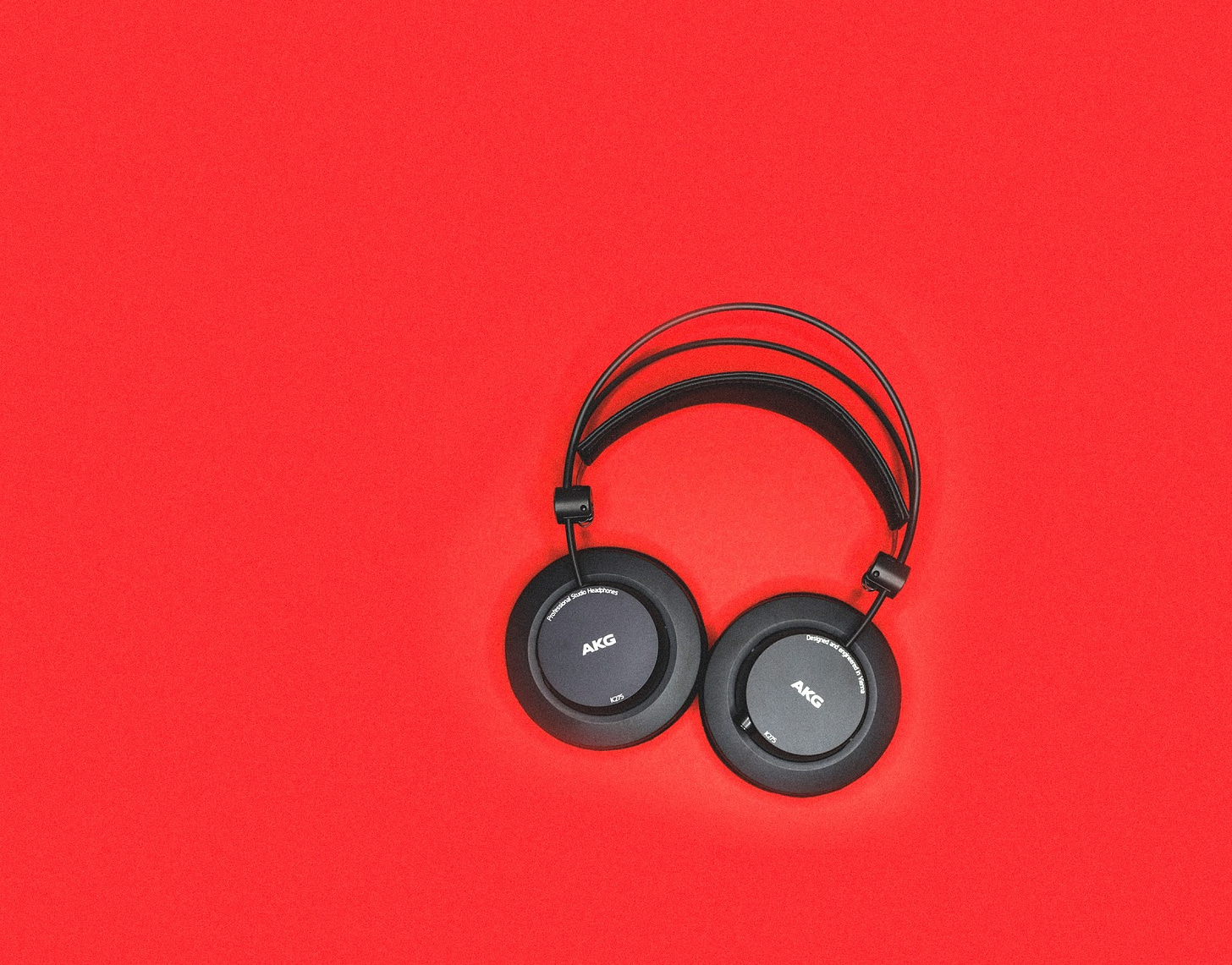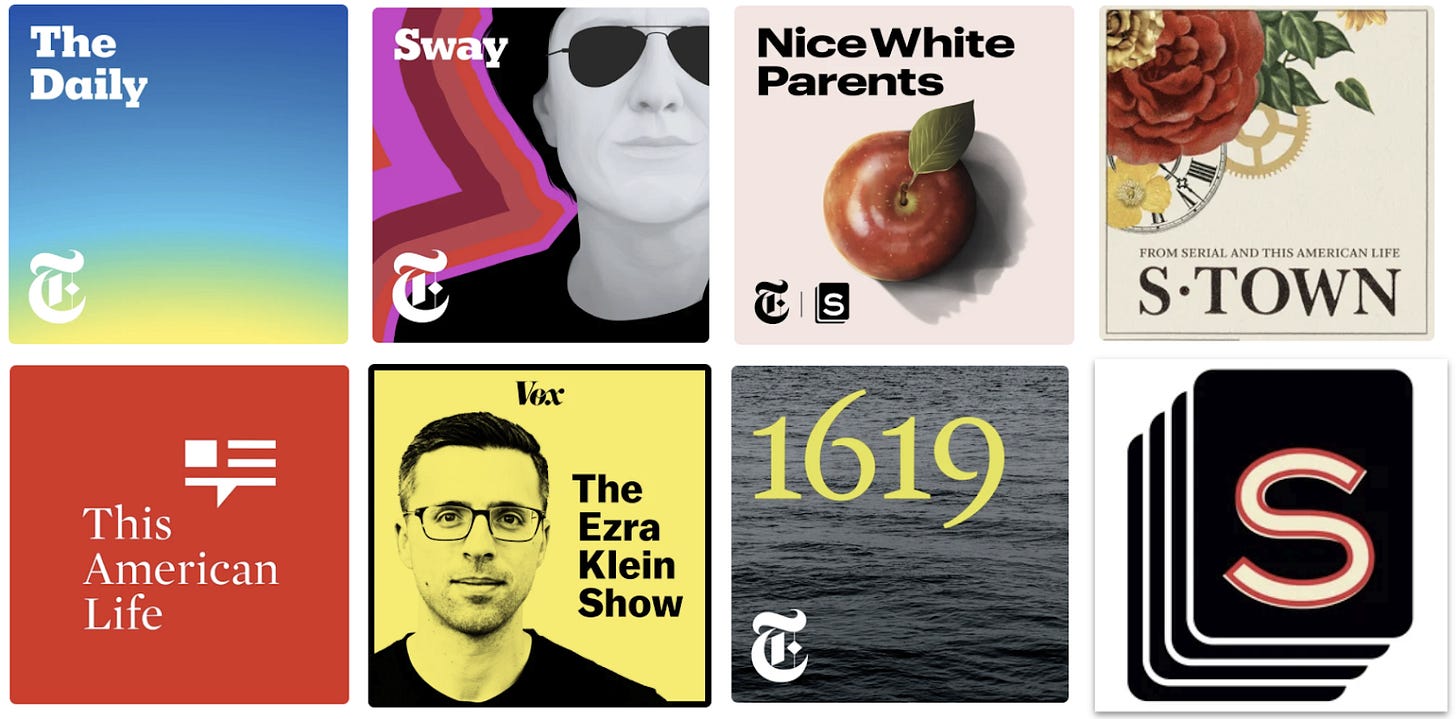The 1992 Summer Olympics were the first time that NBA players were allowed to join the US Olympic team. Led by Michael Jordan, Team USA’s roster included Charles Barkley, Larry Bird, and Scottie Pippen. The team trounced opponents, scoring nearly 120 points per game, winning by 44 points on average, and earning the Dream Team nickname.

While undoubtedly much athletic, The New York Times is building out a different kind of dream team. Led by Michael Barbaro and The Daily, the company is assembling a talented group of audio journalists, producers, and storytellers. Whereas the Dream Team entered the 1992 Olympics a heavy favorite, the Times podcast team is flying under the radar of bigger platforms like Spotify.
The Starting Lineup
The Daily was the Times’ first audio success. Launched in early 2017, the show is now downloaded over 4 million times per day. Most listeners tune in four or five times per week, according to the Times 3Q 2020 earnings call. Additionally, listeners skew younger and more female than the typical Times subscriber.

The company has used The Daily’s platform to launch other podcasts and is investing in expanded audio capabilities. The Times podcast lineup includes:
The Daily: A daily (duh) news podcast hosted by Michael Babaro, a journalist with a proclivity for saying “hmm.” In 2020, The Daily was the third most popular podcast in the US on iOS and Spotify.
Serial Productions: The studio behind popular podcasts Serial and S-Town. The Times acquired the firm in July 2020 for about $25 million. The first show to launch since the acquisition was Nice White Parents, one of the most popular new podcasts in the US on iOS in 2020.
This American Life: Hosted by Ira Glass, winner of the inaugural Pulitzer Prize for Audio Reporting, This American Life is an hour-long program exploring a variety of stories on a theme. This American Life is an independent business, but has a “creative and strategic alliance” with the Times. This means that it will collaborate with Serial on creative, while the Times will work with it on co-marketing and ad sales. The show was the second most popular podcast on iOS in 2020.
Sway: Hosted by aviator-clad journalist Kara Swisher, this bi-weekly show explores power. Recent guests have included Tesla founder Elon Musk and former Secretary of State and presidential nominee Hillary Clinton.
Ezra Klein: Vox founder Ezra Klein will join the Times in early 2021 as a columnist and podcast host. Expect something wonky.
Other times podcasts include 1619, Modern Love, and The Book Review.
Making More Serials
Podcasts play an important strategic role for the Times. Original podcasts can deepen engagement, improve retention, and convert listeners to become paying subscribers. The podcast business also generates ad revenue and cash flow. The Times devotes prime real estate to podcasts on its homepage, suggesting that it sees a serious opportunity in audio.

Original content is a differentiator for subscription businesses. Research by Jeff Prince, a professor at the Kelley School of Business at Indiana University, and Shane Greenstein, a professor at Harvard Business School, found that original content attracts subscribers. Companies like Netflix and Disney+ have shown that pairing original content with a direct user relationship creates a powerful business model.
Turning to audio, Spotify pitches podcasts as a way to grow subscribers and improve retention. The company has invested hundreds of millions of dollars in exclusive content like Joe Rogan and Michelle Obama. This strategy is progressing. In February 2019, Spotify revealed that podcast listeners spent almost twice the time on the service as music-only users. Later that year, the company reported that podcasts were driving increased engagement and higher free to paid conversion. Spotify reiterated that podcasts were improving engagement, retention, and conversion in February 2020.
The Times is running a similar playbook, albeit on a smaller scale. Podcasts like The Daily serve as an onramp for its journalism. The show is a top of the funnel traffic source for its digital subscription. In an interview about the Serial Productions acquisition, Stephanie Preiss, Times VP of Audio and TV, said that:
I think what The Daily has taught us is that audio can help drive our consumer subscription business by acting as an entry point for people to Times journalism...we are very interested in how we can add fuel to that fire.
Creating another hit like The Daily is an unrealistic expectation, but the Times can build a supporting cast of shows, growing its audience and deepening engagement. A rationale for the Serial acquisition was to create more Serials.
Nice White Parents, a show about race and public education, was the first collaboration between Serial Productions and the Times. It launched in July 2020 and ranked second in Apple’s annual rankings of biggest new podcasts in the US. Similarly, Ezra Klein and Kara Swisher have created successful shows like The Ezra Klein Show, Recode Decode, and Pivot on other platforms. The Times has the assets to launch successful podcasts.
While financial terms aren’t disclosed, it seems like the Times is writing checks for tens of millions of dollars, an order of magnitude smaller than Amazon and Spotify. There’s something a little Berkshire Hathaway-esque about the company’s acquisition strategy. In shareholder letters Warren Buffett trumpets that Berkshire Hathaway may not be the highest bidder, but is a safe harbor for businesses, providing managerial autonomy, a sterling reputation, and a long-term orientation. Large tech platforms are able to pay more, but the Times provides a strong brand for serious storytellers who want to practice their craft at the highest level. This seemed to be important in Serial’s decision to sell. In an interview with The Wall Street Journal, Julie Snyder, executive editor of Serial Productions said:
We’re incredibly proud of ‘Serial,’ and wanted to find a home where we felt shared values, one where we would be supported and resourced to tell more stories, of the highest quality.
Podcast Napkin Math
The Times doesn’t disclose podcast revenue, but it’s possible to approximate. The company's 2019 annual report notes that podcast advertising was the primary driver of digital ad revenue growth. The line item that podcasts are folded into grew by $14.5M in 2019. Since then, the company has launched more podcasts and The Daily’s audience has expanded. Through the first nine months of 2020, podcast revenue grew 19% YoY:
Investment blog Mine Safety Disclosures excellent pitch of The New York Times estimates that The Daily generates between $11 million and $73 million in revenue per year:

The midpoint of this range is $42 million, similar to podcast network Wondery’s annual revenue for 2020. In early December, The Wall Street Journal reported that Amazon was in talks to buy Wondery for over $300 million, a 7x sales multiple. Investments by Amazon and Spotify suggest that they see podcasting as a valuable opportunity.
Ask someone what the New York Times is and the knee jerk reaction is a newspaper, and possible a failing one. Digging deeper reveals that the Times is building a suite of digital assets, including a digital subscription business that’s seven million subscribers strong and podcast business that is small, but growing daily, hmm by hmm.
Disclosure: The author owns shares in The New York Times.
For more like this once a week, consider subscribing 👇
👉 If you enjoyed reading this post, please share it with friends!








